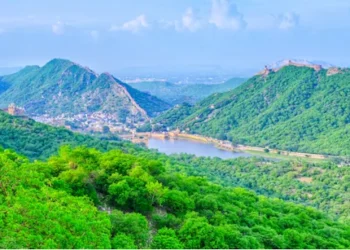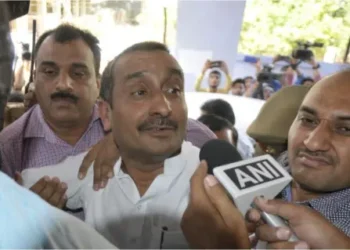The 1967 Act, which empowers the state to acquire tribal chief rights over land, is being used to bypass hereditary systems of land ownership, tribal leaders argue. They allege that the Act was passed without consent from the Hill Areas Committee — in violation of Article 371C of the Constitution.
BY PC Bureau
August 4, 2025 — Tribal leaders from Manipur’s hill districts have submitted a detailed memorandum to President Droupadi Murmu demanding the immediate repeal of the Manipur (Hill Areas) Acquisition of Chief Rights Act, 1967, calling it “unconstitutional, colonial in spirit, and a direct assault on the identity, autonomy, and traditional governance of tribal people.”
The memorandum was submitted on behlaf of Kuki Inpi Manipur , where tribal communities, particularly from the Kuki-Zo ethnic group, have raised alarms over what they describe as a sustained attack on their traditional land rights by valley-based political forces. The 1967 Act, they argue, is at the center of this conflict.
What is the 1967 Act?
The Manipur (Hill Areas) Acquisition of Chief Rights Act, 1967 empowers the state government to acquire the rights of tribal chiefs over land in the hill areas, particularly “chief rights” — a reference to the authority traditionally exercised by tribal chieftains over land management, inheritance, and governance within their village territories.
READ: Congress Woman MP Mugged in Delhi’s VIP Zone: Chain Snatched
Tribal leaders argue that this Act, enacted during the period when Manipur was a Union Territory (before statehood in 1972), was imposed without consultation, and has since served as a legal mechanism to erode tribal autonomy.
“It violates every principle of natural justice and democratic consultation. The Hill Areas Committee was not consulted. No consent was taken from the chiefs or their communities. Yet, the Act grants sweeping powers to acquire hereditary land rights,” said a tribal leader from Kangpokpi.
Violations of Constitutional and Legal Provisions
The memorandum cites violations of multiple constitutional guarantees and central laws, including:
- Article 371C of the Indian Constitution, which provides for the Hill Areas Committee (HAC) of the Manipur Legislative Assembly and mandates that no legislation affecting tribal interests be passed without its recommendation. “This Act was passed without HAC’s recommendation, rendering it invalid ab initio,” the document argues.
- Article 300A, which guarantees the right to property to every Indian citizen. The tribal leaders allege that the 1967 Act deprives them of this right without due process or compensation.
- The Indian Succession Act, 1925, which recognizes traditional systems of inheritance, especially in tribal communities, and is allegedly bypassed by the 1967 Act.
- The Right to Fair Compensation and Transparency in Land Acquisition, Rehabilitation and Resettlement Act, 2013, which lays out procedural and compensatory safeguards in case of land acquisition — provisions not adhered to under the 1967 framework.
Why Now?
Kuki Inpi Manipur claims that recent attempts by state officials, particularly from the Meitei-dominated valley, to implement the 1967 Act in hill areas have escalated tensions. “There is a pattern of creeping encroachment through law, not bullets. This is legal colonization,” said a Kuki Students’ Organisation representative in New Delhi.
 READ: End of an Era: Shibu Soren, Jharkhand’s Architect and Tribal Icon Dies
READ: End of an Era: Shibu Soren, Jharkhand’s Architect and Tribal Icon Dies
Recent land surveys, eviction drives, and reclassification of forest lands in hill areas — often carried out without consultation — have renewed tribal fears of dispossession. The memorandum warns that the 1967 Act is increasingly being used to legitimize these activities, despite decades of tribal resistance.
A Call to the President
The memorandum calls on President Murmu, as the constitutional custodian of tribal rights, to:
- Repeal the 1967 Act in full,
- Direct the Ministry of Tribal Affairs and the Ministry of Home Affairs to investigate violations of tribal land rights in Manipur,
- Uphold the legislative authority of the Hill Areas Committee under Article 371C,
- Recognize and protect hereditary chieftainship as a legitimate and constitutionally protected institution of governance in tribal areas.
They have also urged the President to constitute a high-level commission to study the historical and legal grievances of hill tribes in Manipur and recommend structural safeguards.
Historical Significance of Chieftainship
In tribal society across Manipur’s hills, chieftainship is not merely a political role but a civilizational institution — encompassing land management, conflict resolution, social justice, and community welfare. Chiefs are seen as stewards of ancestral lands, and any attempt to dilute their powers is seen as an attack on the entire community.
Observers say this move by the Kuki tribal leaders may reignite long-standing hill-valley tensions in Manipur. While the Meitei-dominated valley has often pushed for integration and administrative uniformity, hill communities have consistently demanded greater autonomy and protection under the Sixth Schedule — a demand that has gained momentum since the 2023 ethnic violence.
Legal experts say the 1967 Act has never been implemented uniformly, partly due to resistance and partly due to the political sensitivity of tribal land issues. However, its presence on the statute book allows for future misuse, which the petitioners now seek to prevent.













